Please Take Note: This is a review of the final game, but it might change slightly based on the success of the Kickstarter campaign. The game is being reviewed on the components and the rules provided with the understanding that “what you see is not what you might get” when the game is published. If you like what you read and want to learn more, we encourage you to visit the game publisher’s website or visit the Kickstarter campaign. Now that we have all that disclaimer junk out of the way, on with the review.
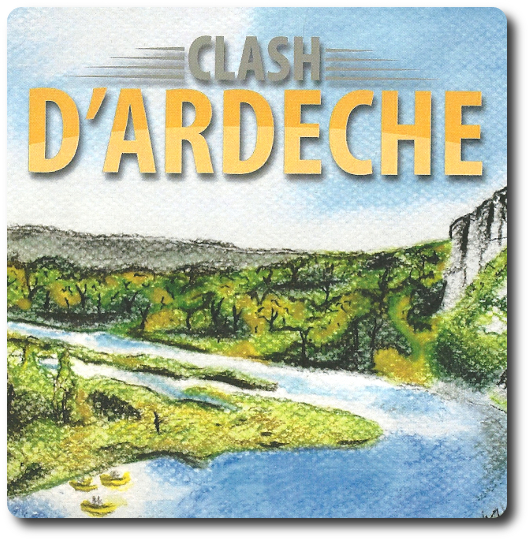
The Basics:
- For ages 8 and up (publisher suggests 12+)
- For 2 to 4 players
- Approximately 60 minutes to complete
Geek Skills:
- Active Listening & Communication
- Counting & Math
- Logical & Critical Decision Making
- Reading
- Strategy & Tactics
- Risk vs. Reward
- Hand/Resource Management
- Bluffing and Misdirection
- Worker Placement & Area Control
Learning Curve:
- Child – Moderate
- Adult – Easy
Theme & Narrative:
- Develop a profitable campsite empire in the beautiful French countryside
Endorsements:
- Gamer Geek approved!
- Parent Geek approved!
- Child Geek mixed!
Overview
People visit the countryside to reconnect with nature, unwind, find balance, and most importantly, have fun. They stay at campsites that range from hotels to little more than a dirt path that leads into the trees. Behind each is a person with a business plan who sees the camping season as a hunting season for camper’s wallets. Join the hunt.
Clash d’Ardèche, designed by Jan Willem van Dijk and to be published by Gaudete Games, will reportedly be comprised of 1 game board, 4 Player boards, 53 Tent chips (13 per player, in 4 different colors), 20 Star Buildings (5 per player, in 4 different colors), an assortment of Money chips (in the values of 1, 5, and 10), 20 Travel Guide Review chips (5 per player), 4 Camping Boss meeples, 80 Tent meeples (20 per player), 10 “Orange” Tent meeples, 1 Start Player card, 4 Explanation cards (player aids), 8 Assignment cards, 9 Camping Ground Upgrade cards, 20 Price cards, and 36 Bribe cards. If that sounds like a lot, it is, but the game’s components are easy to manage. Most of the game’s content belongs to the players. The overall bulk of the game to be used during a single playing session largely depends on the number of players in the game. As this is a review of a prepublished game, I cannot comment on the game component quality.
Setting Up Camp
To set up the game, first place the game board in the middle of the playing area. Place the 9 Camping Ground Upgrade cards next to the game board, face-up.
Second, shuffle the Bribe cards and place them face-down to create the Bribe draw deck.
Third, give each player 1 bag of player components which will consists of 1 Camping Boss meeple, 1 Player board, 5 Price cards, 5 Star Building chips, 13 Tent chips, and 4 $10 Money chips (for a total of $40). All of the components should be the same color.
Fourth, shuffle the Assignment cards and hand 1 to each player, face-down. Players should look at their card, but keep their secret assignment hidden during the game. Place the rest of the Assignment cards face-down next to the game board.
Fifth, at this time, players should organize their play area, separating the chips and meeples into pools and placing their Player board in front of them.
Note: If playing with only 2 players, take 1 of the 2 player components not being used and place the Tent meeples on the designated spaces on the game board. These spaces are no longer available to the players for purchase.
That’s it for game set up. Determine who will go first and begin.
The Beauty and Dirty Politics of the Great Outdoors
Clash d’Ardèche is played in rounds, phases, and turns. There are no set number of rounds in the game. A single round is comprised of 2 phases, which are summarized here.
Phase 1: Low Season
The Low Season is a time to update and maintain previously purchased camping sites, as well as purchasing new land to expand. On the player’s turn, they can do one or more of the following actions and in any order.
Buy a Campsite
For $5, the player can purchase land to expand their campsite domain. The player’s first campsite is free. After that, each additional campsite will force the player to financially invest in their future. Once the land is purchased, the player places a Tent chip on the location, signifying that they own a stake in that property and it’s now open to guests. The location will determine the number of total Tent chips that can be placed. For example, a pasture can take 1 Tent chip, but a mountain can take up to 2 tent chips.
Build a Star Building
Star Buildings are premiere structures that add character and convenience to a camping site. Once built, they improve the campsite’s overall rating. Star Buildings includes swimming pools, restaurants, and the like. Basically, everything that removes the “roughing it” while roughing it when camping. When building, the Tent meeple is placed, reducing the number of guest the campsite can accommodate, but improving the quality of the accommodations for those who stay. The only limitations for Star Buildings is that they cannot be built in mountain locations.
Star Buildings are not only open to those who are placed in the same location. There are some guests who are willing to walk from one location to another to use a Star Building. As such, the placement of Star Buildings should take into account the surrounding locations and the overall length of travel. In this way, a player can organize their purchased land into a larger camping ground instead of just focusing on a single site.
Place Upgrades
All Star Buildings can be upgraded with bonuses. Guests that travel to see the special Star Building are only available during the High Season and bonuses must be used at that time. Upgrading Star Buildings requires money and certain conditions be met.
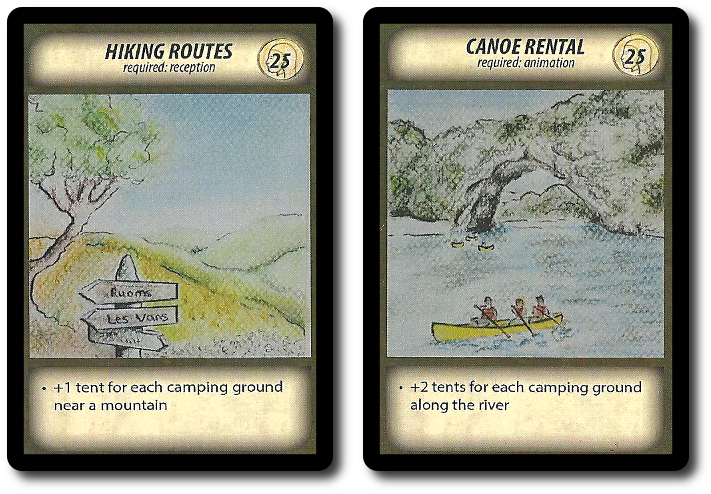
Recruiting Guests
And by “recruiting”, I mean luring them into campsites. Which sounds creepy, but it’s not. This is business and business will only be good if people stay at the player’s campsites. Lucky for the player, they have a wide variety of outlets to connect to their target market. Advertisements can be sent via the Internet, papers, radio, television, and in various travel guides. Once successfully recruited, the guests will keep returning. This makes advertisements an investment in the player’s financial and possibly victorious future.

Pay Bribes
While the player can get much done on their own, using finances and savvy media memes to attract guests, they have no authority over the local politicians. Lucky for the players, the politicians will be happy to work with them if certain “gifts” are provided and undocumented. Bribes grease the squeaky wheel and help the player take actions that would not otherwise be available to them. For example, if the player gives the Mayor a lovely gift basket containing wine, a cigar, and a tasteful necklace, the Mayor would be most pleased to approve the rearranging of the player’s camping site.
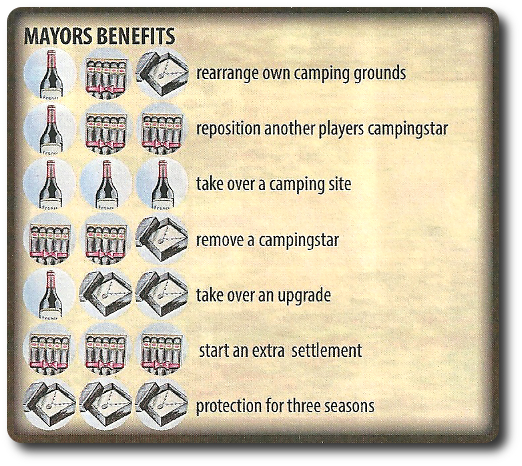
Once the player has taken their actions, the next player in turn order sequence takes their actions. After all players have had a chance to take a turn during the Low Season, the next season begins.
Phase 2: High Season
While the Low Season was turn based, the High Season can be played by the players simultaneously, although I do not personally recommend it when teaching the game. During this phase, the following steps takes place in the order listed here, but players should not advance to the next step until all the players have completed the current step.
Step 1: Place Tents
The players take their Tent meeples on their Player board and place them to their campsites on the game board. Players can also place their Tent meeples on the Mayor’s House location. Campsites will have a limited number of possible Tent meeples that cannot be exceeded. Any bonuses provided by upgrades are triggered at this time. Tents placed on campsites will provide income, while those placed on the Mayor’s House will allow the player to draw Bribe cards.
Steps 2: Determine Prices
All players now determine what they will charge their guests. This is done by players secretly selecting 1 of their 5 Price cards and placing it face-down in front of them. Once all players have finished placing a card, they are simultaneously revealed.
Step 3: Price-Quality Scale
Greed will not get a player far in this game, but greed does motivate the players to build more so they can charge more. Each player places their Camping Boss meeple on the number of stars equal to the total number of stars provided by the player’s Star Buildings. Then the players determine which campsite will provide the most funds based on the highest rating. Guests will leave the worst rated and seek out the best for the price the player selected. Guests between the best and the worst remain where they are located, but those leaving the worst will travel. The meeple is moved to the next best camping site that can accommodate them. Once that is full, they move on to the next best until all the guests have accommodations. In this way, a player can “pull” guests from opponents.
Step 4: Income & Mayor’s Benefits
Every player receives Money chips per tent they have in their campsites. The money collected is based on the player’s selected Price card. For every Tent meeple located on the Mayor’s House location, the player draws 1 Bribe card. Players who have a campsite that boarders the Mayor’ House location can draw 1 extra bonus Bribe card.
All Tent meeples are then taken off the game board and returned to the player’s Player board.
Step 5: Determine Starting Player & Reviews
If a player currently holds the highest price-quality value, they become the next round’s Start Player. If there is a tie, there is no change the Start Player.
If a player currently holds the lowest price-quality value, they receive 1 Travel Guide chip. If this is the second chip given, the player collects the “Orange” Tent meeples, which can be used as bonus Tent meeples during the next round.
This completes a single round of game play. The next round now begins.
Winning the Camp Trophy
The game continues until a player completes their Assignment card, per the card’s description. Once a player does, they announce they have finished their assignment and reveal their card. The other players should check to determine if the assignment was completed correctly. If there are no faults found, the player is the winner of the game.
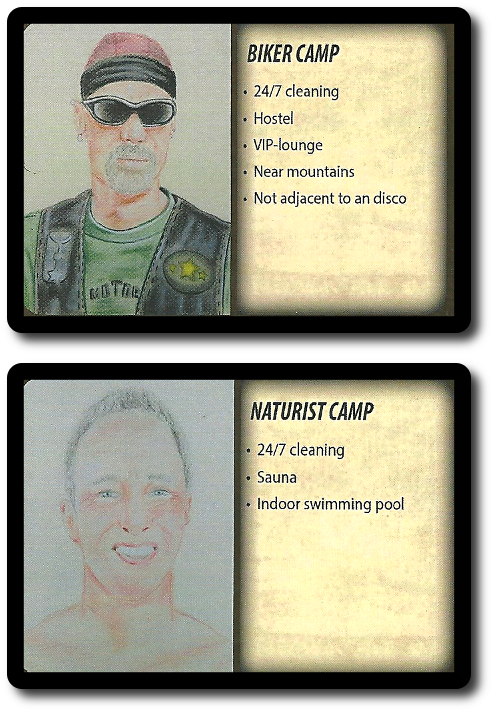
To learn more about Clash d’Ardèche, visit the game publisher’s website or visit the Kickstarter campaign.
Final Word
The Child Geeks had a difficult time finding the fun in the game. They liked the way the game was played well enough, enjoying the very easy to follow phases and steps. This also made it very easy to teach, resulting in very little downtime between educating the players and playing the game. What they didn’t much care for was the game’s theme. Accord to one Child Geek, “I don’t feel like I’m camping and I don’t understand why I should care about on site over another.” But the Child Geeks loved the fact that each player had a secret way of winning. As one Child Geek put it, “The best part of this game is working towards your assignment in secret. None of the other players know why you are doing anything, which makes it fun to win the game under their noses!” When the votes were in, the Child Geeks gave Clash d’Ardèche a mixed vote. Roughly half found the game to be so-so at best, while the other half enjoyed the experience enough to give the game their thumbs-up.
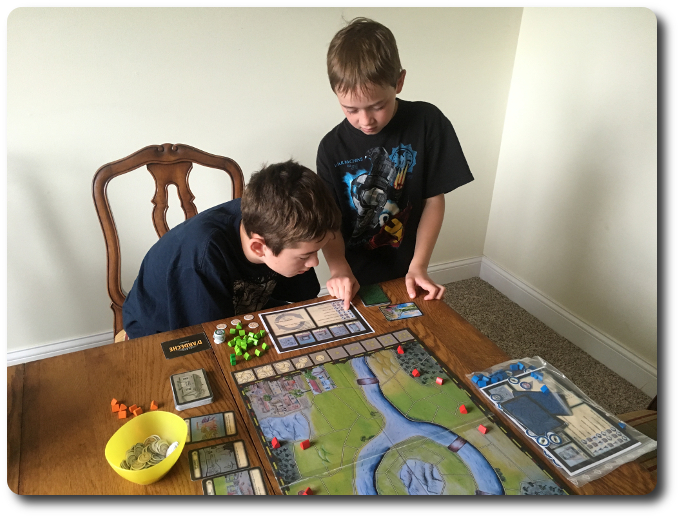
Younger brother teaching his older brother how to play – a proud Father Geek moment…
The Parent Geeks liked the game’s concept, but were a bit lost when it came to connecting to the game’s theme. According to on Parent Geek, “You know, it’s funny, but I have no problem getting into games about zombies, robots, and aliens. I just can’t get into a game about competitive campsites in France.” Theme aside, the Parent Geeks found the game play to be fast and fun, with just enough depth of play to keep everything engaging, but not overwhelming. As one Parent Geek put it, “The assignments in the game give each player their own objective, which for the most part keeps the players out of each others hair. Still, you have to battle it out, as time is an issue.” And I think this particular Parent Geek nailed it. The game has no time limit, but this is a race. If the player is to win, they must meet their objective as quickly as possible. This means players must be savvy enough to know when to take risks, invest in their infrastructure, and hold back when it seems like they should move forward. All the Parent Geeks voted to approve Clash d’Ardèche.
The Gamer Geeks liked the game and, like everyone else, raised an eyebrow when it came to the game’s theme. According to one Gamer Geek, “The game’s theme and game play work just fine together, but I’m not familiar with the theme to get much out of it. I just look at the game as building small towns with populations.” Which works just fine within the context of the game. Another Gamer Geek said, “The game is pretty simple in its execution, but it does require players to think, come up with strategies, work their plan tactically, and watch the other players. Best of all, this is a game with risk, but zero luck. I love that.” When all the games were over, the Gamer Geeks approved Clash d’Ardèche.
Like all the other players, I never found a meaningful connection to the game’s theme. I would normally say that this makes me believe the game’s theme is pasted on, but I think it’s more likely that I am not familiar enough with the region in France portrayed in the game. A pity, as it sounds beautiful. In the end, I think my lack of connection is the sad consequence of me not seeing the world, rather than the game’s design.
Game play is quick and a player must be decisive. Too many moment of wondering what you should do will cause the game to slow down to a point where it becomes semi-painful. If a player is paying attention when it’s not their turn, they should be able to complete their actions when their turn comes around. Since everyone is working towards different goals, what actions should and should not be taken are based on such things as current funds and the actions taken by opponents.
Bribery seems out-of-place in this game, but this might also be some political commentary. As an outsider, I simply cannot say. As a game player, the act of bribing to do something that seems like I can just pay for it out of my own pockets sounds specifically like a government that is controlling more than what it should. It works within the game, but it feels like an unnecessary component. Camping out on the Mayor’s lawn and then gifting bottles of wine to essentially illegally steal another opponent’s campsite works in the long run, but feels out-of-place from the very start.
Tactics are a must, as is bluffing. If an opponent figures out what you are attempting to do in order to win, the game turns really ugly really fast. This is where the tactical play comes in. It’s sometimes better for a player to go off into the proverbial weeds to complete a few actions that have nothing to do with their agenda in hopes of throwing their opponents off. But a player needs to be subtle about it. Changing gears to quickly will make it obvious that the player is attempting to mislead. In this game, what you do and how you do is very important. Too much time spent on the goal will make it obvious what needs to be achieved. Too little and you won’t win.
Taken as a whole, Clash d’Ardèche is a good game. The game play and theme keep it feeling like it isn’t as tacked down as it should be, but the game’s ease of play and engagement soon help a player forget any misgivings they might have. While I think the game’s theme is uninteresting and disconnected from the game itself, I very much enjoyed myself while playing it. If you are interested in exploring this game, get your tent and your bag of trail mix; then take a hike and see where it leads you.
This is a paid for review of the game’s final prototype. Although our time and focus was financially compensated, our words are our own. We’d need at least 10 million dollars before we started saying what other people wanted. Such is the statuesque and legendary integrity of Father Geek which cannot be bought except by those who own their own private islands and small countries.


Hi there, thank you for this elaborate review of Clash d’Ardèche. We just relaunched our Kickstarter campaign after renewing all the artwork: https://www.kickstarter.com/projects/117402901/clash-dardeche-campground-tycoon